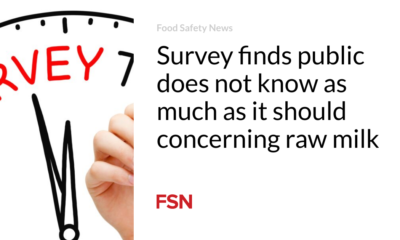Business
They say size doesn’t matter. They lie

There may be few certainties in life, but when it comes to the world of marketing, there are several hard facts that explain why it’s really, really hard to go from a small business to a big one.
Some of these issues are simply a byproduct of the way our economy works, while others have much more to do with human behavioral psychology and the mysterious way our brains sometimes work.
During my career I have worked for some very large companies. I also started my own, slightly smaller business, so I’ve experienced these laws of marketing from both sides. What’s holding back smaller businesses, and how can you ‘hack’ the system if you’re a small business looking to grow bigger?
The fame problem
The first and most fundamental barrier to small businesses is the human brain. We are programmed to pay attention to the familiar, so we essentially only notice things we already know. People who are shopping just don’t “see” unfamiliar brands in the same way as the big brands, even when they are right in front of them. In this way, the marketing of those larger brands works much more effectively than that of more obscure brands.
I experienced this firsthand at a conference we sponsored. Our logo was up all day in front of the delegates, but when I asked a visitor over coffee if he’d ever heard of us, I got a rather blank ‘no’.
So while small brand marketing has to work much harder to get noticed, those big, well-known brands continually capture little bits of attention every time we see them, making them even more familiar. There’s a reason why people still drink Coke.
Fear of doing it wrong
The attention problem is compounded by the issue of trust. We are emotional beings and there is no emotion stronger than the fear of failure or shame. When it comes to those larger, more expensive purchases – like those we see in the B2B sphere – the fear of making the wrong decision far outweighs the potential benefits marketed to us.
The result is a tendency to buy from companies we consider “proven,” which tends to be – you guessed it – bigger brands. And the code for ‘proven’ is often ‘I’ve heard of it’. Defaulting to these (theoretically) proven brands helps absolve us of the sense of personal responsibility when things do go wrong. After all, we bought from a brand that everyone knows can be trusted, so it’s not our fault it didn’t work out, right?
This is an important point, especially in B2B marketing, because the buyer is not only familiar with brands, but also brands that the boss is aware of. This gives even more reason to play it safe and makes it even harder to push away well-known brands.
Economies of scale
Larger companies not only have a marketing advantage over smaller ones in terms of customer psychology, they also have budget efficiency on their side. There are a thousand ways large companies can benefit from economies of scale. I recently visited an expo full of large companies. They had many more customers, which allowed them to purchase a larger booth, which allowed them to benefit from better placement, visibility and so on. This obviously plays out in multiple scenarios in B2B marketing, but also on the consumer side. The big brands can buy the most visible advertising spaces and displays, and this adds to our original issue of attention and awareness.
In the same way, large companies benefit from manpower. Great marketing is hard work and requires extreme attention to many small details. Getting any of these mistakes wrong could mean a devastating waste of money. In the SMB world, it’s entirely possible that there simply isn’t a dedicated marketing team with endless resources and deep pockets, making it difficult to put that detailed work into every campaign.
Double jeopardy
Finally, we come to the law of double jeopardy. This is an annoying situation, especially for small companies. It says that not only does a small business have fewer customers, but those customers are also less loyal than those of larger companies.
The concept of repertoire purchasing dictates that larger brands get more customers and a larger share of the disposable revenue from those customers. Unfair, isn’t it? This is closely related to our first point, but has been converted into hard figures.
Marketing as a small business not only has to work harder to even get traction with the average consumer and then actually convert them into a paying customer – it also has to work much harder than the bigger brands to keep them coming back .
Why small is beautiful
Given the enormous obstacles that seem to be working to hold the little guy back, should smaller brands throw in the towel and give up? The answer is of course: no.
First of all, there is absolutely nothing wrong with being small. You can target a specific market or customer type and become known to those people. You may not want to go “big.” Niche marketing works well. Becoming famous for a few.
As a smaller company you also have one big weapon at your side: creativity. You can break the rules and get attention in ways that big company marketers might not like to do. Being small doesn’t give you an excuse to be boring when it comes to your marketing. Say something else. Be surprising. And do it in a new way. Small businesses aren’t typically run by committee, so it’s more feasible to be braver and take a little more risk on a great marketing idea. Creativity attracts attention. Whether from customers or the press, or nowadays on social media.
Smaller companies are also in a great position to connect their small but beautiful brand with a larger company that will give you that reach. Large companies often use smaller companies to add value and differentiate themselves – a win-win scenario.
By being smaller you can in principle get much closer to your customer and understand him much better than with a large multinational. Find new and engaging ways to reach them and better meet their needs. This is a fundamental skill of marketing and smaller companies are often inherently closer to their customers to make this happen.
Keep going
It may seem like the odds are stacked against you as a small business, and while that is the case in many ways, in many more ways smaller businesses are uniquely positioned to do things differently and make a real impact with their marketing .
As a small business, perseverance is key. Most large companies expect marketing to work quite quickly. If you are a small business owner, you may be willing to spend a significant amount of time growing one step at a time. Your patience can ultimately be your point of difference.
Whatever you do, follow the golden rules: be consistent, be different and know your customer. Someone has to be the big company of tomorrow, right?













